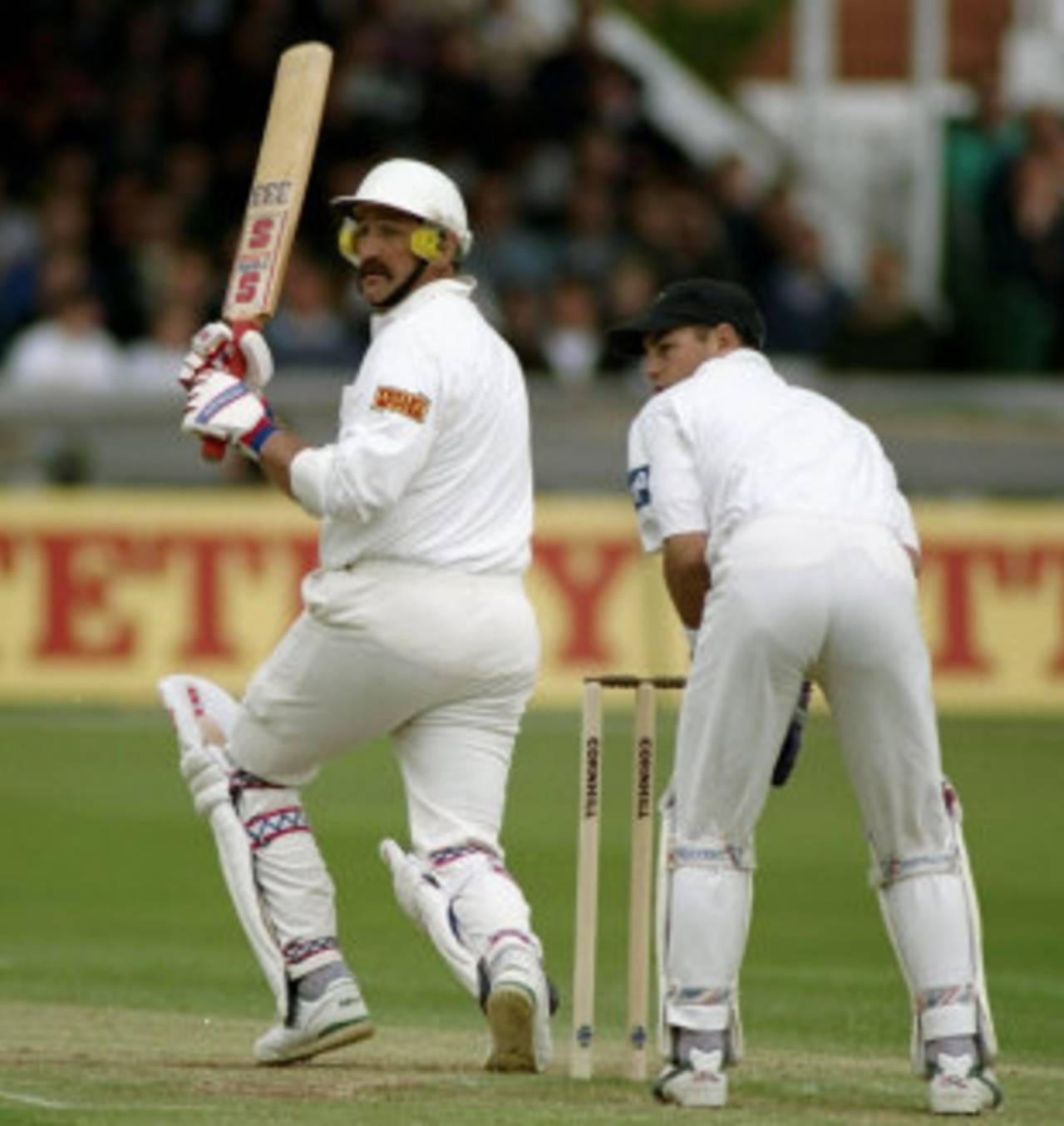Last ball, last wicket, and Northants' parched spell
Also, Vijay Manjrekar's nickname, Abid Ali's no-ball, oldest double-centurions, and this decade's leading players

Graham Gooch: the last batsman over 40 to make a Test double-century • Getty Images
That's a good spot, as the tenth wicket in each innings of that match in Lincoln went down to the last possible ball. It was an exciting game: Scotland ended up just one short of the handy total posted by what was just about a fully representative New Zealand side. It wasn't an official ODI, though - for a start both sides chose from 12 players. There has not yet been an official one-day international in which the last wicket in both innings fell to the last possible ball: the closest approach is the tied match in St Vincent in March 2012, when Australia scored 220 in 49.5 overs and West Indies replied with 220 in 49.4. Interestingly, the most balls bowled in an ODI in which all 20 wickets fell (excluding wides and no-balls) was 640, in the 1983 World Cup final (a 60-over match) between India and West Indies at Lord's.
I hadn't heard this one, although I see it is mentioned on a couple of websites. I asked our Indian office - and got some blank looks there too. And so Sambit Bal, ESPNcricinfo's editor, emailed Vijay's son, Sanjay Manjrekar. Sanjay's reply was to the point: "Never heard of that one. His nickname was Tatt." That one came about, according to Ajit Wadekar, because Vijay fancied himself as an offspinner: Roy "Tatt" Tattersall was England's main offie on the tour of India in 1951-52, and dismissed Manjrekar for 48 in his debut Test in Calcutta on that trip.
Before this year there had been only 18 instances of any team failing to win a match during an entire County Championship season. But not only Leicestershire managed it in 2014: Northamptonshire suffered a similarly barren time on their return to the First Division. The only team other than Leicestershire in 2013 and 2014 to go winless in successive seasons is, again, Northamptonshire. They didn't win at all in 1936, 1937 or 1938. During 1939 they looked set to go an unprecedented 100 matches without a win. However, after gliding winlessly to 99, they then won the 100th game, against Leicestershire at Wantage Road, by an innings!
The Indian allrounder Abid Ali played 29 Tests, although with the ball he never improved on his figures of 6 for 55 on debut, against Australia in Adelaide in 1967-68. After the Australian leg of that tour the Indians moved on to New Zealand, where in the second Test, in Christchurch, they fell foul of the Central Districts fast bowler Gary Bartlett, who took 6 for 38 to set up a six-wicket victory. However, according to their captain, the Nawab of Pataudi, "All the Indian players, including myself, considered Bartlett's action to be suspect." But he wasn't called for throwing, in that or any other match. As New Zealand moved towards their target, Abid Ali deliberately chucked one delivery in protest at Bartlett's escape… and was promptly no-balled for throwing himself by umpire Fred Goodall.
Graham Gooch was actually the fifth - and most recent -batsman past the age of 40 to score a Test double-century in a Test. He was a couple of months short of his 41st birthday when he made that 210 against New Zealand at Trent Bridge in 1994. Dudley Nourse, the old South African captain, was about three months younger when he made a famous 208, complete with broken thumb, in 1951 - also at Trent Bridge. Patsy Hendren completed his unbeaten 205 for England against West Indies in Port-of-Spain on his 41st birthday in February 1930, while his frequent team-mate Jack Hobbs scored 211 against South Africa at Lord's in 1924 when he was 41 years 197 days old. But the oldest Test double-centurion of all was a team-mate of Nourse in that 1951 series: South Africa's spiky opener Eric Rowan was seven days past his 42nd birthday when he made an epic 236 against England at Headingley.
The leading Test run scorer so far in the current decade is Alastair Cook, with 4769: Kumar Sangakkara (4439) and Michael Clarke (4314) are both past 4000 too. Among batsmen who have had at least 20 innings, Shivnarine Chanderpaul (71.18) has the highest average, ahead of Sangakkara (66.25), Hashim Amla (63.80) and AB de Villiers (61.89). The leading Test wicket-taker in the 2010s so far is Jimmy Anderson, with 232, ahead of Dale Steyn (211). Graeme Swann (193) and Stuart Broad (191) come next. In one-day internationals the leaders are Virat Kohli (5395 runs) and Lasith Malinga (181 wickets); in T20s it's Brendon McCullum (1292) and Saeed Ajmal (66).
Steven Lynch is the editor of the Wisden Guide to International Cricket 2014. Ask Steven is now on Facebook